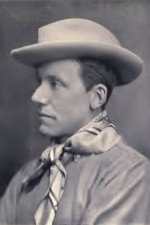Extraordinary People: Hesketh Hesketh-Prichard

One of the best (and most unexpected things) about being a writer in this interconnected world is that I’m in touch with people who are interested in books, reading and writing, and they live all over the place. When it becomes known that I have various research needs, these clever individuals come to the rescue, often pointing me toward the remarkable, the extraordinary and the outlandish – just the sort of thing I revel in.
I’ve mentioned fellow bibliophile Stephen Bresnehan before, and he was the one who brought the imperiously named Hesketh Hesketh-Prichard to my attention. After some investigation, I’ve come to the conclusion that HHP was one of those people that would be difficult to make up. On the other hand, his life was so rich, so varied, so remarkable that it’s a lesson for a writer in how much goes into the making of a person.
HHP was one of those Edwardian fellows who could have stepped out of the pages of Kipling. To know that he wrote Sniping in France as a guide to those chaps in the trenches who were going about it in entirely the long way is an insight into the man. The book is a sometimes startling look at other days and other ways, with an admiring foreward by General Lord Horne of Stirkoke, who begins with: ‘It may fairly be claimed that when hostilities ceased on November nth, 1918, we had outplayed Germany at all points of the game.’
Hesketh Vernon Hesketh-Prichard was born in 1876 in India at the height of the British Raj. His father was an officer in the King’s Own Scottish Borderers and had the poor timing to die a month or so before young Hesketh was born. His mother, Kate, brought him back to England and a life ensued.
He went to Rugby School, college in Scotland and then went on to study law, which he never practised. Life became too busy.
HHP was an outstanding cricketer, a tearaway fast bowler who eventually played for the MCC and was a team-mate of the immortal Dr WG Grace. He had a career best of 8/32 for Hampshire against Derbyshire and was in much demand – but other things took him away from the lure of leather on willow.
He had early success as a writer and soon after specialised in travel and adventure stories. Unlike some of his contemporaries, he actually visited the places he wrote about, along the way honing his marksmanship by potting the local fauna with aplomb. He travelled to the Caribbean, spending time in Haiti and later writing some of the first detailed descriptions of secret voodoo rituals. He worked his way through Panama, documenting construction of the canal and picking up a touch of malaria, which was the sign of a true traveller. He went to Patagonia, in search of the legendary giant ground sloth. He popped up to north-east Canada, working his way through Newfoundland and Labrador before plunging into the interior.
Much of this travel was sponsored by various magazines and newspapers, the readers of which were spellbound by HHP descriptions of wild animals, rugged scenery and colourful foreigners. In between travel writing, he was spinning thrilling yarns about psychic detectives, two-fisted adventurers and cunning mercenaries, while cultivating a literary circle that included J.M. Barrie and Arthur Conan Doyle, who admired his pugnacious and red-blooded writing.
The Great War made things rather more serious for HHP, as it did for the whole world. At 37, he was told he was too old to enlist, so he what he could, working as a Press Officer for the War Office. It was in this capacity that he visited the front lines and saw the horror that was trench warfare. In an effort to redress what he saw as appalling standards among British marksmen, he set up the first Army sniping school. He was able to introduce innovations, such as widespread and accurate telescopic sights, better parapeting, more careful camouflage and observation, and the use of dummy heads to confuse the German snipers. Authorities credited him with saving over 3,500 Allied lives, being awarded the Military Cross for his efforts.
Hesketh Hesketh-Prichard died in 1922, from what is now suspected to be the effects of the malaria he contracted in his travels. He was a man of his times, inevitably, but the breadth of his experiences set him apart from the narrowness that characterised so much of Edwardian society. A fascinating individual.
Reading these articles I’m now even more determined to start researching this year.